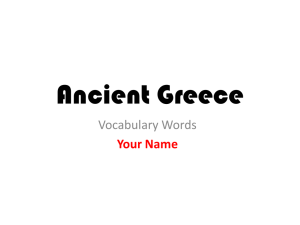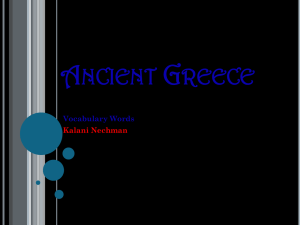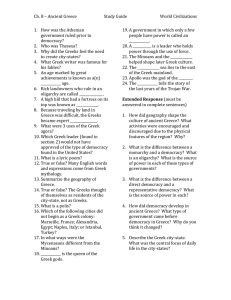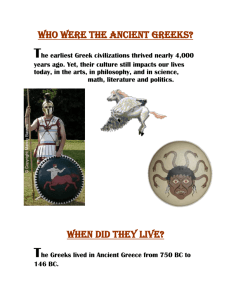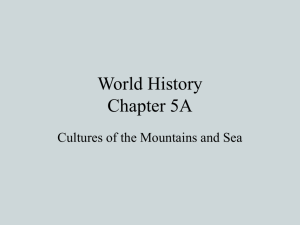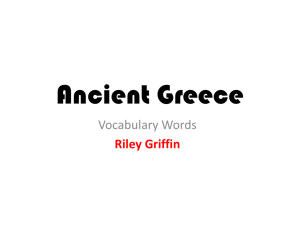Key: Chapter 8 Study Guide A. Quick questions (Answer in one to
advertisement
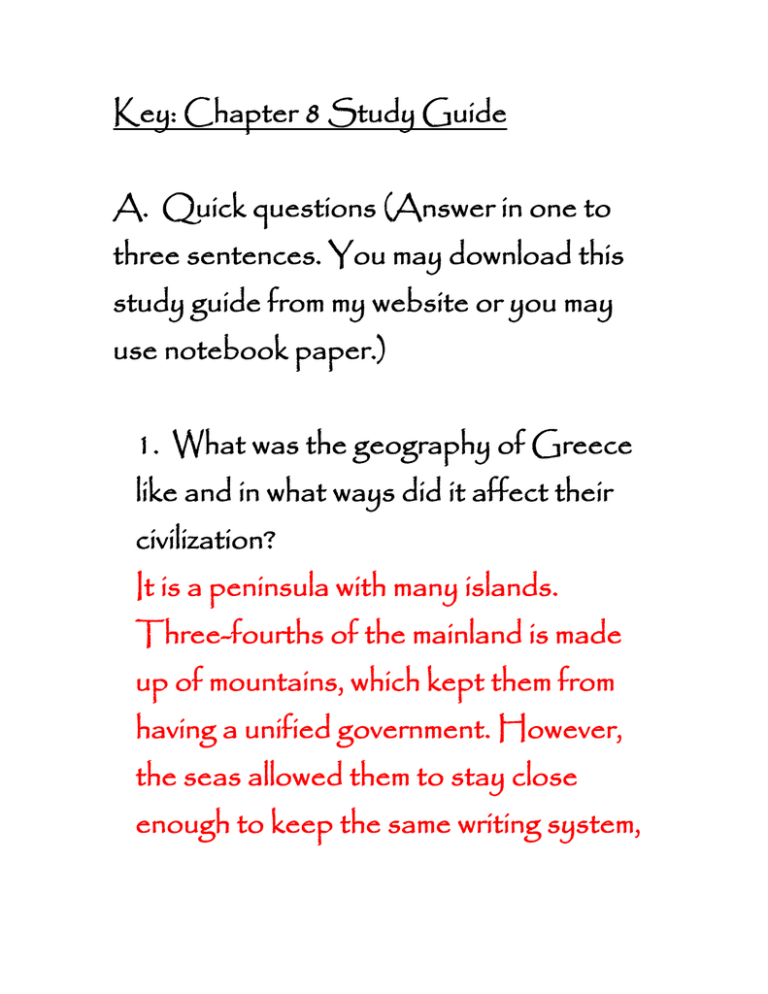
Key: Chapter 8 Study Guide A. Quick questions (Answer in one to three sentences. You may download this study guide from my website or you may use notebook paper.) 1. What was the geography of Greece like and in what ways did it affect their civilization? It is a peninsula with many islands. Three-fourths of the mainland is made up of mountains, which kept them from having a unified government. However, the seas allowed them to stay close enough to keep the same writing system, religious beliefs, and culture. Also, see # 2, 3, & 4 2. Travel was difficult in ancient Greece because of rugged mountains, so how did they become successful traders? By using the seas for transportation 3. Greece is surrounded by three seas. How did this result in the exchange of ideas and religious beliefs? They shared by traveling the seas. 4. Three-fourths of Greece is covered with mountains. How did this prevent them from forming one united government? They couldn’t communicate very often. 5. What is Crete and who lived there? A beautiful island. The Minoans. 6. What is Troy and why is it significant? a city that was the subject of The Illiad . The Trojan War took place there. Know that the Illiad and the Odyssey were written by Homer. 7. Explain what Greece’s Dark Age was like. Trade between Greeks and others stopped. Greeks returned to a simpler way of life. It was as if Greek culture had taken a backward step. 8. Discovery of Minoan paintings revealed what they valued. What was that? The sea 9. Why was Mount Olympus important to ancient Greece? The believed many of their gods lived there. 10. What is a tyrant and why did many tyrants have the support of the people for a while? A ruler who takes over by force. People liked many of them because they ruled fairly. 11. What was the purpose of the athletic festival in Olympia? To honor the god Zeus 12. Who were the hoplites and why were their lives often in peril? They were a wall of foot soldiers who faced the other army’s soldiers first, which was dangerous. 13. How is the Greek alphabet different from hieroglyphics? Hieroglyphics used symbols to stand for ideas rather than sounds. 14. How is the Greek alphabet similar to our alphabet? Both languages use symbols to stand for sounds. The word alphabet comes from the Greek letters and led to our alphabet. 15. How is a myth different from a fable? A myth is a story about gods and how their actions affected people. A fable is a story that uses animals to teach a lesson. 16. Explain how you know that Greek myths reflect Greek ideals, values, and beliefs. The Greeks valued courage, strength, athleticism, and independence, and the gods mirrored these same values. 17. What were the results of Athen’s farmers falling into debt? Solon cancelled all debt, freed slaves, and created fairer laws. 18. What is an oligarchy? Why didn’t oligarchies bring a better life to the poor? Since an oligarchy was rule by a few wealthy people, they had no incentive to better the life of the poor (with the exception of Athens’ leader Solon) 19. Explain the difference of Sparta’s government in peace-time versus wartime. During war-time, two kings ruled. During peace-time 30 elders ruled. 20. What problems did oligarchies face in Greek city-states? Many people stayed poor and became disgruntled. B. Answer in at least two sentences. 1. The Greek bard, Homer, told about an event that happened hundreds of years before he lived. What was the event? Why was it important? How did he know about it? What is the name of his book that told about this event? What was the name of his next book and what did it discuss? Homer told about the Trojan War in the book the Illiad. He told about adventures following the war in his book the Odyssey. The Trojan War was the greatest war in Greek mythology. 2. Were Greek city-states united or rivals? Discuss each of these areas and explain whether the Greeks were united in that area: writing system, culture, religion, Olympics, government. The Greeks in all city-states had the same writing system, culture, and religion. They also all participated in the Olympics. However, in spite of their common culture because of different governments, they remained rivals. 3. Discuss Athen’s oligarchy. How did it lay the foundation for democracy? Compare and contrast it with our democracy today. In Athens all male citizens could participate in the assembly to form laws and vote. Free men were citizens instead of subjects. Solon set up a system basing political rights on wealth instead of birth. Though still not ideal, it was a step in the right direction. 4. Compare and contrast Athens and Sparta. While Spartans were tough and warlike (but still honorable), Athenians were artistic and creative, peace loving, and their oligarchy was the only one who resembled a democracy. The Spartan boys lived in training camps at the age of seven to get an education, participate in sports, and to participate in military exercises. Spartan girls were trained to be strong and had more freedom than girls in other city-states. However, they were raised to be mothers, not to fight. C. Important People (5): In one to three sentences explain who these people are and what they were known for: Mycenaens-were considered to be the first Greeks. They were warlike and conquered Minoa. They also borrowed ideas from the Minoans. Minoans-were one of the earliest civilizations in Greece. They lived on the island Crete. Solon-the ruler of Athens who instituted an oligarchy that influenced the development of democracy Hesiod- a writer. Much of what later Greeks learned about religion came from the works of Hesiod and Homer. Aesop- the writer of the famous Aesop’s fables. D. Define these words (20): migration (review) The movement from one place to another isthmus: A strip of land connecting larger land areas mythology: stories of fictional gods who competed with one another and took sides in human events. They reflected the Greek ideals, values, and beliefs. The Greeks believed the gods controlled their daily lives. Monarchy: a form of government with one ruler (usually a king) Democracy: rule by the people Acropolis: A fort built on top of a large hill majority rule: One principle of democracy that allows a law to be passed when more than half the voters support it colony: a new settlement separated from but ruled by a homeland. Greece spread throughout the Mediterranean region (Africa and Asia Minor) and introduced their culture to other people by setting up many colonies. peninsula: A stretch of land almost completely surrounded by water agora: An open-air market where people gathered to trade and discuss the news of the day helot: A person conquered by Sparta who became a slave. assembly: a lawmaking group fable: a story with a moral or lesson. Greek children learned good behavior from Aesop’s fables. Socialism: a system of social organization that promotes sharing property and wealth with the whole community. (Note: this was NOT practiced in ancient Greece.) veto: to reject mercenary: A soldier who is willing to fight in the army of a foreign country for payment E. Four review questions will be on the test, and they were not in your study guide. You need to know that… 1. the Rosetta Stone was important because it was the key in the translation of hieroglyphic writings. 2. in hunter-gatherer societies, the role of gatherers was to collect seeds and roots for food. 3. During the ice age, sea levels dropped because water was trapped in glaciers. 4. Human patterns of migration often matched the movement of hunted animals.
